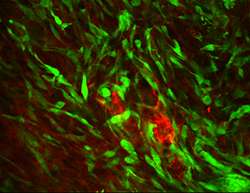Stopping anti-CCL2 breast cancer treatment aggravates the disease

Mohamed Bentires-Alj and his team at the Friedrich Miescher Institute for Biomedical Research (FMI) together with scientists from the Novartis Institutes for BioMedical Research (NIBR) show in a study published today in Nature that a promising therapeutic approach for metastatic breast cancer elicits deleterious effects after cessation of the treatment. Stopping CCL2 inhibition paradoxically increases metastasis formation and leads to premature death thus thwarting the initially beneficial effects of the treatment. This has implications for the design of therapies targeting these processes and indicates that therapeutic approaches to inactivate the chemokine CCL2 should be administered with extreme caution.
The majority of breast-cancer-related-deaths are still caused by metastases. The formation of metastasis as well as tumor growth are influenced by the dynamic interplay between the cells surrounding a tumor (the so called tumor microenvironment) and the tumor cells themselves. "Understanding the cellular and molecular mechanisms underlying the interplay between cancer cells and the tumor microenvironment is of paramount importance. Only by understanding mechanisms of cancer, we will pinpoint efficacious and long lasting treatments" said Bentires-Alj.
In breast cancer, tumor cells secrete a factor called CCL2 that recruits monocytes to the site of the tumor and—through these cells—aggravates prognosis. Therapeutic approaches to inactivate CCL2 have thus been suggested for treatment of metastatic breast cancer. However, a study done by scientists from the Friedrich Miescher Institute for Biomedical Research and from the Novartis Institutes for BioMedical Research published today in Nature is likely to dampen enthusiasm. Scientists from Mohamed Bentires-Alj's (Mechanisms of cancer, FMI) and Tobias Junt's (Autoimmunity Transplantation and Inflammatory Disease, NIBR) teams found that discontinuation of CCL2 inhibition led to a substantial relapse, overshoot of metastasis and accelerated death.
What has happened? In their experiments using mouse models of metastatic breast cancer the scientists could show that once anti-CCL2 treatment was stopped, large numbers of monocytes, which were sequestered in the bone marrow as a consequence of the treatment, rapidly homed to the tumor and to sites of metastasis, where they induced processes that supported cancer progression. In particular, the scientists could show that a cocktail of factors secreted by the monocytes enhanced cancer cell mobility at the primary tumor, and increased blood vessel formation around proliferating cancer cells at the sites of metastasis. The most deleterious effect was brought about by the factors IL-6 and VEGF-A, whose levels overshot dramatically after anti-CCL2 treatment was stopped.
"Our results indicate that anti-CCL2 treatments have to be administered with extreme caution and certainly in combination with other therapies" comments Bentires-Alj. "While the anti-CCL2 treatment indeed decreased metastasis, cessation of the treatment leads to an unexpected rebound, with an increased monocyte influx into the metastatic sites, aggravated metastatic disease and eventually premature death. If a therapy—as in this case—only sequesters cells away from the tumor, the danger exists, that at the end of the therapy the whole system snaps back with harrowing and far-reaching consequences that worsen the prognosis for the cancer patient."
The scientist then went on to probe one possible way out of this dilemma. Bentires-Alj comments: "We believe that combination therapies may be a viable solution. When we combined an anti-CCL2 treatment with an anti-IL-6 or anti-VEGF treatment the effect was less pronounced, metastases were markedly reduced and survival increased."
More information: "Cessation of CCL2 inhibition accelerates breast cancer metastasis by promoting angiogenesis." Nature (2014) DOI: 10.1038/nature13862














